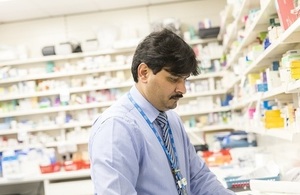Expansion of electronic prescribing at GPs and pharmacies
Regulations will be changed to replace paper prescriptions with electronic ones, saving the NHS money and saving time for patients and staff.

Health and Social Care Secretary Matt Hancock has said he will support the hundreds of GPs and pharmacies still to make the move to electronic prescribing.
As well as financial savings for the NHS of up to £300 million by 2021, switching to electronic prescribing has benefits for patients including:
-
less time spent waiting in pharmacies and GP practices
-
repeat prescriptions can be collected from the pharmacy instead of having to visit the GP first
-
removing the worry about losing paper prescriptions
There has already been growth in the use and availability of electronic prescribing by a majority of GP surgeries, from less than 1% in June 2010 to 63% in June 2018. More than 6,000 GPs are already able to upload prescriptions electronically, which can be downloaded by a pharmacist, saving time for staff and patients.
But thousands of paper prescriptions are still issued each year – due to current regulations limiting the circumstances in which electronic prescriptions can be issued.
Changes to these regulations will be made later this year, to expand electronic prescribing for nearly all prescriptions.
Health and Social Care Secretary, Matt Hancock, said:
We need to harness technology across the NHS to improve care, save time for patients and make the lives of hardworking staff easier. In an NHS where thousands of GP surgeries already enjoy the benefits of electronic prescriptions, it can’t be right that there are occasions when archaic paper prescriptions still have to be used.
As part of our long-term plan, I want the NHS to become the most advanced healthcare system in the world. Electronic prescribing both saves GPs’ time and helps to give patients a better, more seamless experience and ensures every pound of taxpayers’ money is spent effectively.